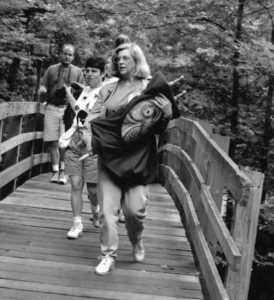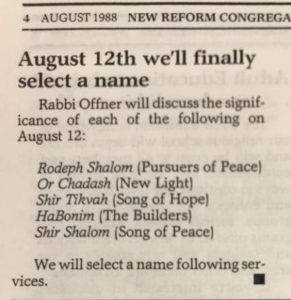Rabbi Stacy Offner was in a small bit of disbelief at the idea that the synagogue she founded will be celebrating its 30 anniversary. “I can’t be that old,” she said, tongue-in-cheek. “It’s been an amazing ride for the synagogue. It has had an impact on the world – I really believe that’s true.”
Shir Tikvah held its first service on May 13, 1988, in the St. Paul Jewish Community Center, eventually ending up at its current home at Minnehaha Parkway and 50th Street in Minneapolis.

Gloria Weinblatt walks the Torah up Minnehaha Creek from the St. Paul JCC to their current location.
The congregation started as a breakaway from Mount Zion Temple after Offner was fired, she said, because she is a lesbian.
“Shir Tikvah explicitly stood for respect of gays and lesbians; it was at its core but not the whole,” she said. “It was about love and relationships and people in a new way. If we could embrace people, all people, who came together to share our commitment to justice and righteousness and community and holiness. We wanted to offer that full embrace and the people responded.”
Jay Benanav was one of the seven people who met for pizza that night; he said he had no clue that Shir Tikvah would grow to what it has.
“Never in my wildest dreams.,” he said. “It was a desire to have a progressive, inclusive Jewish community who felt that others weren’t the right thing for them, or the unaffiliated who needed something. All that inspired us.”
Benanav – along with his wife Lucy Kanson, and their sons— had been at Mount Zion with Rabbi Offner. He said that the founding group didn’t envision all the challenges they ran into when they started.
“We were in our 30s; how hard could it be?” Benanav said.
Pretty hard, it turned out. Expecting between 10 and 20 families at first, there were 40 that showed up for the first services. Offner’s office was in the St. Paul Council of Churches office. People didn’t want to move to Minneapolis and chose to leave.
“There’s [550] families now. With growth comes challenges too. Every step of the way has come with challenges,” he said. “Change is always difficult.”
Benanav was the president when they bought their current building from the First Unitarian Church of Minneapolis and negotiated use of the church’s new building at 3400 Dupont Ave. S. for High Holiday services. “There’s not a lot of room left at either place,” he said. “That’s a good problem to have.”
Offner pointed out the ecumenical dominoes that took place; the church on Dupont had previously been the home of Adath Jeshurun Congregation before it built their home in Minnetonka.

The name didn’t get chosen for several months after the congregation was founded.
“We spend significant time deeply wrestling with being singers of hope, to believe that everyone has a voice and lift it up, joyously,” Latz said. “And hope, which gets short shrift, is a radical response to despair. It’s why rabbis crafted Shabbat with such attention. So to be both inheritors of the vision and be purveyors of it, that is what [Rabbi Abraham Joshua] Heschel meant when talked about radical amazement.”
“It’s about deeper relationships with one another, and amplifying the voices of the most vulnerable as we read about in Torah,” he said. “I’m looking creatively to inspire the next generations to live Jewish lives. Judaism is a moral force for justice and equity work, which we all agree is in serious demand.”
Latz is a Minneapolis native who grew up at Temple Israel but attended the first Shir Tikvah service. Offner was familiar with Latz and worked with him.
“He was one of the bright kids,” she said. “I felt like I knew him well as a high school student who wanted to be a rabbi for all the right reasons. He’s a worthy successor. And he’s keeping the heartbeat pounding.”
Offner left Shir Tikvah in 2008 after being recruited to work at the Reform movement’s headquarters in New York – in part because of her success having grown Shir Tikvah to what it had become 20 years in as a model of growth. Latz joined from Kol HaNeshamah, the synagogue in Seattle where he was the founding rabbi.
“I give all the credit to Rabbi Offner and the founders who had the vision to be welcoming but demanding, inspiring but with a serious moral obligation to do better,” Latz said.
Benanav said the transition from one progressive rabbi to another was seamless but hard.
“I adore Rabbi Offner and it was hard to lose her, but change is hard,” he said. “Michael is progressive and has all the stuff we’re looking for. The oldtimers? We were sad to see her go. But you can’t hold on to even great things forever.”
Benanav said Shir Tikvah has a membership balance of all ages, which he sees as one of the strengths of Shir Tikvah.
“I don’t think we tried to identify as an LGBT congregation. That was never the identity or what we wanted to be,” he said. “We wanted to include everyone and I think we achieved that. I’m proud that we have that mindset.”
Offner, who has gone back to the pulpit at Temple Beth Tikvah in Connecticut, said that she doesn’t look at her departure from Mount Zion as a blessing in disguise; instead, she cited what Joseph said to his brothers in the bible.
“‘You meant it for harm but God turned it into good,'” she said. “Very good things came out of it ultimately.”
Latz is visible in the community, working very closely with faith leaders from other religions throughout the Twin Cities, which he says is the responsibility of every rabbi in every community.
“A remarkably deep part of Shir Tikvah’s work is to constantly stay engaged in a partnership with the world around us,” he said. “We take it with a level of seriousness that I take great pride in. I’m so grateful for relationships that Rabbi Offner and others built that I stepped into.
“We live in a world where boundaries and borders are different than 30 years and alliances are changing. I feel so unbelievably grateful to do this. It’s my professional responsibility today to meet with a pastor and an imam. How awesome is that?”
Friday, May 25, 6:30 p.m.: 18/30 Shabbat Services with Rabbi Menachem Creditor, Neshama Carlebach & Rabbis Latz, Rappaport, and Lekach-Rosenberg.
Saturday, May 26, 7:30 p.m.: 18/30 Concert with Neshama Carlebach. Tickets are $36 and available here.

















